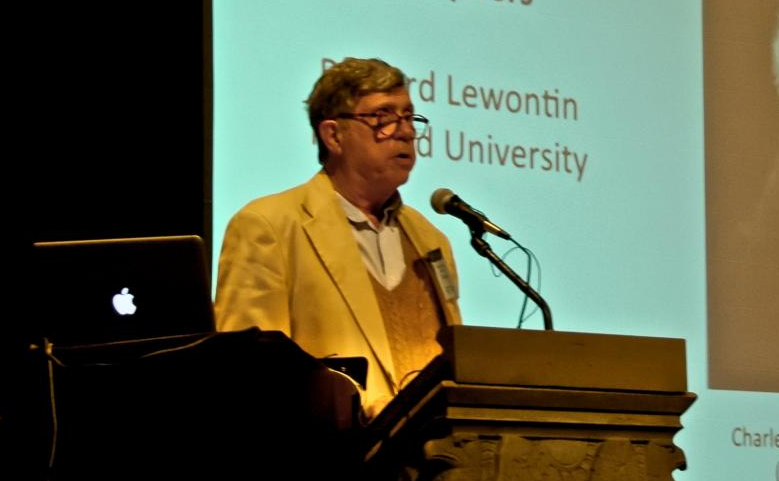December 27, 2021
Se réapproprier la science
By Camille Rullán
A version of this article was published in French by À bâbord ! (no 90, décembre 2021).

All cultures have creation myths: the book of Genesis, the Rig Veda, Coatlicue or even Manifest Destiny. These stories explain who we are and how we got here, reveal our preferences and prejudices. Western science arose in response to myth to offer us a supposedly value-free, unadulterated view into nature’s inner workings. Like myths, science has its heroes: men (or, mostly men) who, often single-handedly, discover fundamental truths about the universe. Galileo, Newton, Darwin, Einstein—we know who they are.
Just as science has its heroes, it also has its anti-heroes: notorious ones like Stanley Milgram, Josef Mengele, Edward Teller, the Tuskegee experimenters. The popular narrative denounces them as isolated abusers of an otherwise functional scientific machine.
But there are likewise hidden cases of scientific abuse. Consider the birth control pill.1 Developed by Harvard physicians, Drs. Pincus and Rock, and funded in part by Margaret Sanger, founder of Planned Parenthood, it was originally intended to bolster a program of racial eugenics on colonized and “undesirable” people.
These pills were tested on Massachusetts asylum patients and working-class Puerto Rican women without their consent, often to deadly outcomes.
A radical perspective of science recognizes these incidents for what they are: not one-off mistakes, but products of a system in which science is an economic activity, controlled, like the rest of society, by a small minority which have a vested interest in perpetuating exploitation and oppression.
The ruling class, through the government, philanthrocapitalists and corporations, fund most scientific research today. On a more granular level, decisions about who gets certain grants, admission to élite programs, or tenure-track jobs are made by senior scientists—a notoriously affluent, white, male, able-bodied group with their own interests and worldviews. These worldviews, in turn, shape the practice of science. Science as a neutral and objective practice is just another creation myth.
—
Attempts to reform scientific activity, through government regulation, charitable donations, diversity and inclusion initiatives, have failed; individual actions cannot address the political and economic system at the root of the problem: capitalism. The word radical, as writer and activist Angela Davis describes it, means “grasping at the root.” This, in many ways, is our vocation as scientists: understanding the roots of natural phenomena through experimentation, discussion and collaboration. But radical science takes a step further by looking at the roots of science not as pre-existing truth but as social practice, one whose consequences have everything to do with the ways in which it is brought forth and wielded.
From this comes the necessity of understanding the ways in which capital and power influence and distort the production, use, as well as the nature of science and, more critically, of re-imagining the ways we practice science. There is no hero that can give us this. The only way forward is through collective action, for scientists to put their skills at the service of the people and against the oppressors, through a science for (and by, and of) the people.
—
The societal problems that the first iteration of SftP faced are still relevant today. One of SftP’s foundational struggles was against theories of biological determinism.2 The Sociobiology Study Group, formed by SftP members in response to attempts to legitimize sociobiology, argued against using evolutionary and genetic theory to explain human behavior. Together with feminist and Black activists, they picked up the ideological arms and began pushing back against the reactionary theory. Today, biological determinism rears its ugly head in other forms. New technologies like CRISPR or GWAS are repackaged as a modern-day genetic determinism, used to justify heinous ideas around scientific racism, sexism and ableism.3 These ideas have no factual basis; they are created and perpetuated by the ruling class to maintain the status quo. And they will continue to surface so long as inequality continues to exist and needs justification.
Another cornerstone issue for SftP is the militarization of scientific knowledge. The anti-war movement gave birth to SftP, and anti-militarism has always been central to our work. Original SftP members rightly identified militarization as the quintessential expression of how science upholds Western imperialism, colonization and the oppression and exploitation of the majority of people around the world. Back then and now, weapons manufacturers like Raytheon and Lockheed Martin feed the war machine and profit enormously off the work of scientists.4 A science for the people is a science from below, at the service of liberation and international solidarity. Through the Anti-Militarism working group as well as chapter organizing, SftP members continue to work to disentangle militarism and science.
Some of the issues we work on today are relatively new, or have a renewed urgency: surveillance and policing, agroecology and health care. One area where we’ve done significant work is the climate crisis. Although geoengineering has long been militarized, it has only recently started to be considered a potential mitigator of the climate crisis.5 These techno-fixes promise an “easy way out” from our predicament, yet completely ignore the root of the problem. Not only are their downstream effects often poorly understood, these technologies threaten to lull us into a false sense of complacency with the systems that created the problem in the first place.6 In our magazine and in our organizing, we call for a truly radical, emancipatory vision of climate justice: one centered around decolonization, just transition, and the empowerment of the working class, Indigenous Peoples, and historically oppressed communities.7
—
What separates SftP’s vision from the mainstream, liberal vision of science is that we recognize all of the aforementioned issues as deeply interrelated. They emerge from capitalism, the dominant political and social system which stratifies access to knowledge, funding, training; dictates ideological as well as material support for certain research questions and methodologies; and delegitimizes certain forms of knowledge, in particular Indigenous knowledge, in favor of knowledge that exists to further entrench existing hierarchy. Our critique allows us to put forth a vision of a science for (and of, and by) the people.
A science for the people is in service of, informed and wielded by those who have been traditionally excluded from the scientific enterprise: the working class, the Global South, the oppressed and marginalized. It is also one in which scientists meaningfully recognize themselves as workers, products of and responsible for the social reality their labor engenders. This requires us to move away from the perverted, dominant paradigm of a science done by vaunted individuals in prestigious institutions and towards a democratically organized, non-hierarchical production of scientific knowledge.
—
Our goals are reflected in the structure of our organization. SftP is a bifurcated organization—a set of local chapters and working groups across the United States, Mexico, Thailand, England and Canada, and a publication committee which produces our triannual magazine issues. Decisions are taken democratically. We elect a secretary, treasurer, managing editor and publisher whose role is to facilitate the work of the rest of the organization.
This bifurcation is borne of the necessity for a division of labor, but it has always been porous; members of our publication team are intimately involved in organizing with chapters and working groups, and our magazine issue themes often emerge from (and are led by) activists in our different chapters. There is a tendency on the left to eschew direct action in favor of intellectual rigor, or else embrace practical knowledge while neglecting theoretical understanding. The former is certainly true for scientists, who are conditioned to be apolitical and often actively discouraged from engaging in efforts beyond the field or the lab. Our organizational structure is intended to synthesize knowledge and action by bringing serious intellectual rigor into the movement we ourselves take part in, while confronting power with action in what have previously been purely intellectual, academic and professional spaces.
To do so, our publication serves as an outlet for our organizing work where we disseminate information about various movements, call for solidarity in actions, and publish work articulating alternative visions for science. At the same time, through discussion of our ongoing struggles, the publication also offers in-depth analysis of the broader political, economic, and philosophical framework under which we set ourselves the task to effect change. With it, we hope to inspire more like-minded people outside the organization to pursue common goals.
The chapter organizational structure is purely grassroots: individual chapters decide what issues to devote their time to based on the needs of their communities and in collaboration with local activists. Our Twin Cities chapter, for example, has recently been participating in the movement to stop the Enbridge Line 3 pipeline, which would not only transport nearly a million barrels of tar sands a day but do so through Anishinaabe lands. Working to support Indigenous leaders, the Twin Cities chapter has coordinated mutual aid efforts, public panels, and informative materials. Organizers from the group have also been present at frontline resistance camps. Other chapters work with academic unions to improve working conditions for university workers, or organize demonstrations around topics like open access to COVID-19 research or climate justice, often in collaboration with leftist organizations such as the Sunrise Movement, the Red Nation or the Democratic Socialists of America.
SftP’s working groups bring together members from across different chapters to organize around specific issues. These efforts are similarly often collaborative and reflect the international nature of our organizing. The Anti-Militarism group is working in tandem with organizations across the country and world in coordination for STEM support of BDS, and the Puerto Rico group has hosted teach-ins on solar power with activist groups on the island. Though our organizing is wide in scope, our overarching goal is to connect activists and scientists under a shared anticapitalist pursuit in order to fracture power and create room for a more just vision of science.
—
There are those who will insist that SftP’s political stances are unnecessary excursions from what is the only truly objective discipline or, worse, that they corrupt our ability to do good science. To this, we say that objective science does not exist in any meaningful way. Science is ultimately, as Helen Longino says, social knowledge.
Even the most avowedly apolitical scientist is, in their apathy, operating at the service of dominant institutions. None of us arrived at our interests, our research questions, our labs, objectively, and we can never truly absolve ourselves of responsibility for the knowledge we create. Our research questions may seem like problems of esoteric intellectual interest, but their applications are certainly not—why else would the US Department of Defense fund basic academic research to the tune of $2.6 billion dollars?8 The claim that “science is neutral” is itself a political statement, one that aligns with ruling class interests. What gets named as political is what (or who) challenges the hegemonic, invisible ideology.
Science is not prescriptive—the use of scientific knowledge is a critical part of the practice of science. This is what Richard Levins described as the dual nature of science: modern science is simply “an episode in the growth of human knowledge in general, and as the class, gender, and culture-bound product of Euro-North American capitalism in particular.” Our approach is not to be skeptical of all science (anti-science) or to place scientific truths on a pedestal (scientism). Rather, we recognize that scientific knowledge is not a universal truth untainted by human affairs, but rather a product of our labor and societal conditions.
Science has been used as a tool of profit accumulation, oppression, and violence, but it has also meaningfully contributed to our understanding of the world and made a better, healthier, safer place for many. Despite its dark origins, birth control pills have materially improved living conditions for the hundreds of millions around the world who currently use it. Yet tools like these are still in the hands of capitalists, enriching private pharmaceutical companies. To fully realize the emancipatory potential of science we must intentionally create a different kind of social system for producing and accessing knowledge.
The horrors of the Vietnam war radicalized a generation of SftP members, leading them “to question the neutrality of science, to question the isolation of scientists from society” and to imagine ways in which “scientific activities can be performed in collective and non-capitalist ways.” We are proud to be scientists, excited by science and devoted to our craft. We are also equally devoted to continuing the tradition of SftP and working towards creating a truly emancipatory science: one which does not alienate us from society at large but instead achieves its potential as an engine for social change.
—
Camille Rullán is a graduate student in theoretical neuroscience at NYU, the current secretary of SftP and the former managing editor of SftP magazine.
Notes
- Andrea Natalia Rivera Rosario, “Birth, Under Control,” Science for the People 23, no. 1 (2020), https://magazine.scienceforthepeople.org/vol23-1/birth-under-control/.
- Richard Lewontin, “Biological Determinism as an Ideological Weapon,” Science for the People 9, no. 6 (November/December 1977), 36–38, https://archive.scienceforthepeople.org/vol-9/v9n6/biological-determinism-ideological-weapon/.
- Søren Hough, “Runaway Biology: A Call for Conscientious Genome Editing with CRISPR,” Science for the People 23, no. 3 (2020), https://magazine.scienceforthepeople.org/vol23-3-bio-politics/crispr-runaway-biology-conscientious-genome-editing/; Kevin Bird, “Still Not in Our Genes: Resisting the Narrative Around GWAS,” Science for the People 23, no. 3 (2020), https://magazine.scienceforthepeople.org/vol23-3-bio-politics/genetic-basis-genome-wide-association-studies-risk/.
- Bob Park, “Raytheon: The Tip of a Stolen Iceberg,” Science for the People 3, no. 3 (July 1971), 14–18, 26–27, https://archive.scienceforthepeople.org/vol-3/v3n3/raytheon-tip-stolen-iceberg/.
- Erik Wallenberg, “From the Archives: Weather Manipulation and Militarism,” Science for the People (2018), https://magazine.scienceforthepeople.org/geoengineering/archives-weather-manipulation-militarism/.
- Holly Jean Buck, “A Best-Case Scenario for Putting Carbon Back Underground,” Science for the People (2018), https://magazine.scienceforthepeople.org/geoengineering/best-case-scenario-carbon-underground/.
- The Volume 23, No. 2 Editorial Collective, “Letter from the Editors,” Science for the People 23, no. 2, https://magazine.scienceforthepeople.org/vol23-2/peoples-green-new-deal-editors-letter/.
- “FY21 Budget Request: Department of Defense,” American Institute of Physics, accessed December 27, 2021, https://www.aip.org/fyi/2020/fy21-budget-request-department-defense.





